Robert M Derry
Colony Member
When it comes to creating three dimensional characters, I feel as though I have quite a different approach to many writers and I'm not sure if I'm missing the mark here?
A few weeks ago in a creative writing group, we were given the below list (it's quite long) and it was suggested that we build a new character using the below titles;
Name
Age
Date of birth
Place of birth
Height
Weight
Hair colour
Eye colour
Skin tone
Shoe size
Scars/handicaps
Mannerisms/habits
Favourite food/drink
Favourite colours
Education
Attitude to life
Ambitions/fears
Skills/interests
Home
Parents
Family
Current situation
What will make the reader like/dislike your character?
What will make the reader remember your character?
I looked down this list and felt as though the most important aspect of character was missing: Motivation. This suggestion got a rather subdued response, but to me, what drives a character is surely their most important aspect, plus it immediately gives you a sense as to their role in your story. Alternatively you could create a great character that has no place in your story, because they lack the motivation to exist within it.
What drives us as individuals, what pushes us to get out of bed each morning, is the core of our being and that surely must be the key part of your character that you need to understand in order to flesh them out.
I also think this list approach is nonsensical, it doesn't seem to appreciate that traits are interlinked. For example, you can't start with your character's name! In order to know what your characters name is you need to know where they come from first. I kind of imagine my key characters growing out from a central idea or concept and one trait logically slots the next one into place.
I also have an issue with focussing too much on appearance first. Behaviour dictates appearance, not the other way around. Surely you've got to decide who your character is, in order to understand what they look like?
I also tend to find that when I'm reading, I ignore the writers specific description about the characters appearance. In my head, I form an idea of what characters look like based on their behaviour and the way they speak. I don't like it when writers try and box me in with very prescriptive features.
Besides some of these traits in these list approaches are totally arbitrary. For example in the list above; eye colour, favourite food, shoe size, favourite colour are (unless they are purposefully distinctive) pointless pieces of information as they don't inform anything about how your character behaves. My favourite food is Pizza and I'm quite confident that, that fact says nothing important about me as a person.
Maybe I'm being harsh, maybe I'm missing something, but I just feel that these list character bios miss the mark.
Any thoughts?
A few weeks ago in a creative writing group, we were given the below list (it's quite long) and it was suggested that we build a new character using the below titles;
Name
Age
Date of birth
Place of birth
Height
Weight
Hair colour
Eye colour
Skin tone
Shoe size
Scars/handicaps
Mannerisms/habits
Favourite food/drink
Favourite colours
Education
Attitude to life
Ambitions/fears
Skills/interests
Home
Parents
Family
Current situation
What will make the reader like/dislike your character?
What will make the reader remember your character?
I looked down this list and felt as though the most important aspect of character was missing: Motivation. This suggestion got a rather subdued response, but to me, what drives a character is surely their most important aspect, plus it immediately gives you a sense as to their role in your story. Alternatively you could create a great character that has no place in your story, because they lack the motivation to exist within it.
What drives us as individuals, what pushes us to get out of bed each morning, is the core of our being and that surely must be the key part of your character that you need to understand in order to flesh them out.
I also think this list approach is nonsensical, it doesn't seem to appreciate that traits are interlinked. For example, you can't start with your character's name! In order to know what your characters name is you need to know where they come from first. I kind of imagine my key characters growing out from a central idea or concept and one trait logically slots the next one into place.
I also have an issue with focussing too much on appearance first. Behaviour dictates appearance, not the other way around. Surely you've got to decide who your character is, in order to understand what they look like?
I also tend to find that when I'm reading, I ignore the writers specific description about the characters appearance. In my head, I form an idea of what characters look like based on their behaviour and the way they speak. I don't like it when writers try and box me in with very prescriptive features.
Besides some of these traits in these list approaches are totally arbitrary. For example in the list above; eye colour, favourite food, shoe size, favourite colour are (unless they are purposefully distinctive) pointless pieces of information as they don't inform anything about how your character behaves. My favourite food is Pizza and I'm quite confident that, that fact says nothing important about me as a person.
Maybe I'm being harsh, maybe I'm missing something, but I just feel that these list character bios miss the mark.
Any thoughts?



